Overview of Kuwait International Bank
VerifiedAdded on 2022/03/05
|7
|1741
|28
AI Summary
The Kuwait International Bank was established in 1973 as Kuwait's first Islamic bank. Kuwait International Bank offers both individuals and businesses a variety of Islamic financial services. For the period, it has been listed on the Kuwait Stock Exchange and controlled by the Kuwaiti Central Bank. KIB a bank that operates according to the Islamic Shari'ah from 1st of July 2007, is a public quoted company.
Contribute Materials
Your contribution can guide someone’s learning journey. Share your
documents today.

Special Topics in Accounting
Secure Best Marks with AI Grader
Need help grading? Try our AI Grader for instant feedback on your assignments.
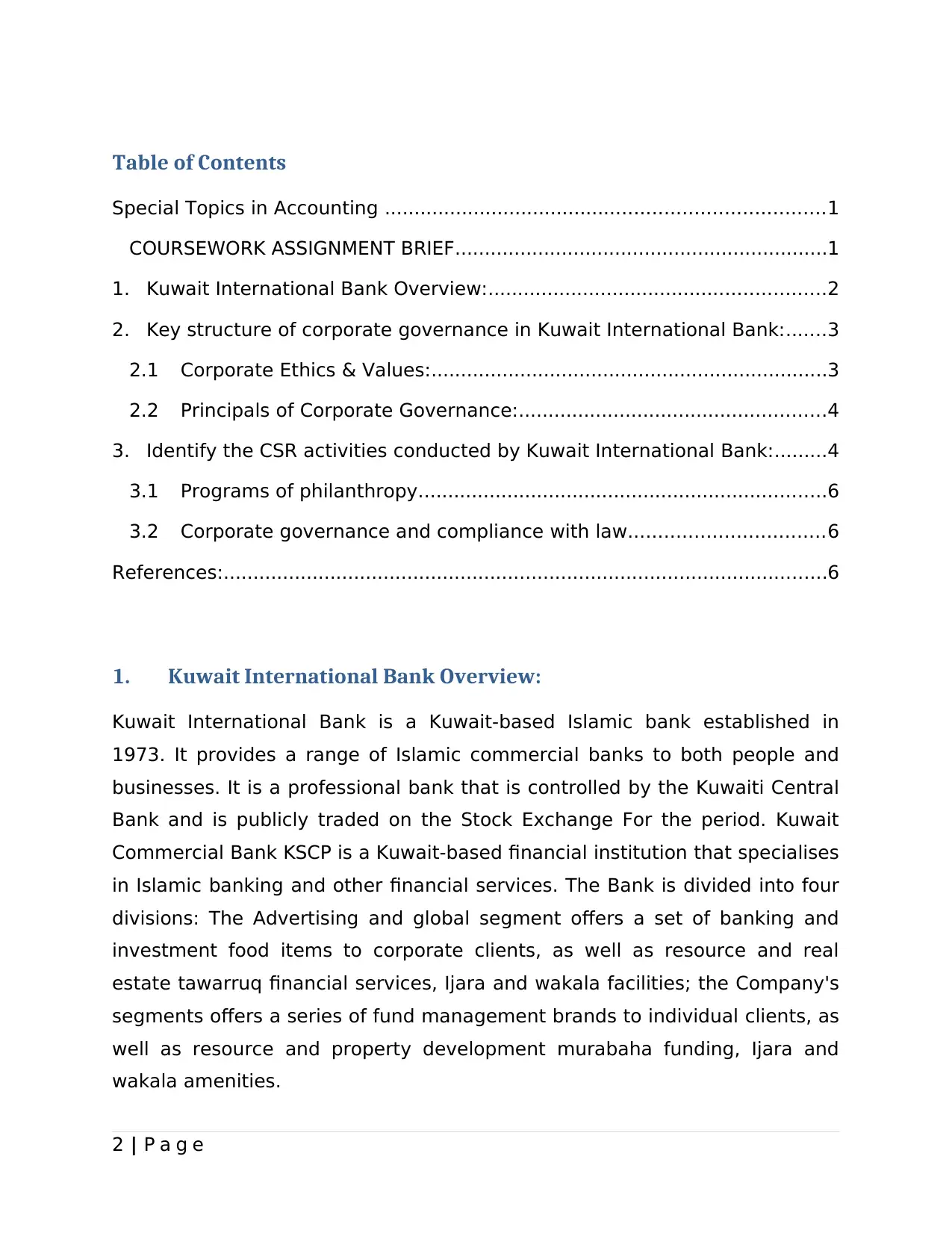
Table of Contents
Special Topics in Accounting ..........................................................................1
COURSEWORK ASSIGNMENT BRIEF...............................................................1
1. Kuwait International Bank Overview:.........................................................2
2. Key structure of corporate governance in Kuwait International Bank:.......3
2.1 Corporate Ethics & Values:...................................................................3
2.2 Principals of Corporate Governance:....................................................4
3. Identify the CSR activities conducted by Kuwait International Bank:.........4
3.1 Programs of philanthropy.....................................................................6
3.2 Corporate governance and compliance with law.................................6
References:......................................................................................................6
1. Kuwait International Bank Overview:
Kuwait International Bank is a Kuwait-based Islamic bank established in
1973. It provides a range of Islamic commercial banks to both people and
businesses. It is a professional bank that is controlled by the Kuwaiti Central
Bank and is publicly traded on the Stock Exchange For the period. Kuwait
Commercial Bank KSCP is a Kuwait-based financial institution that specialises
in Islamic banking and other financial services. The Bank is divided into four
divisions: The Advertising and global segment offers a set of banking and
investment food items to corporate clients, as well as resource and real
estate tawarruq financial services, Ijara and wakala facilities; the Company's
segments offers a series of fund management brands to individual clients, as
well as resource and property development murabaha funding, Ijara and
wakala amenities.
2 | P a g e
Special Topics in Accounting ..........................................................................1
COURSEWORK ASSIGNMENT BRIEF...............................................................1
1. Kuwait International Bank Overview:.........................................................2
2. Key structure of corporate governance in Kuwait International Bank:.......3
2.1 Corporate Ethics & Values:...................................................................3
2.2 Principals of Corporate Governance:....................................................4
3. Identify the CSR activities conducted by Kuwait International Bank:.........4
3.1 Programs of philanthropy.....................................................................6
3.2 Corporate governance and compliance with law.................................6
References:......................................................................................................6
1. Kuwait International Bank Overview:
Kuwait International Bank is a Kuwait-based Islamic bank established in
1973. It provides a range of Islamic commercial banks to both people and
businesses. It is a professional bank that is controlled by the Kuwaiti Central
Bank and is publicly traded on the Stock Exchange For the period. Kuwait
Commercial Bank KSCP is a Kuwait-based financial institution that specialises
in Islamic banking and other financial services. The Bank is divided into four
divisions: The Advertising and global segment offers a set of banking and
investment food items to corporate clients, as well as resource and real
estate tawarruq financial services, Ijara and wakala facilities; the Company's
segments offers a series of fund management brands to individual clients, as
well as resource and property development murabaha funding, Ijara and
wakala amenities.
2 | P a g e
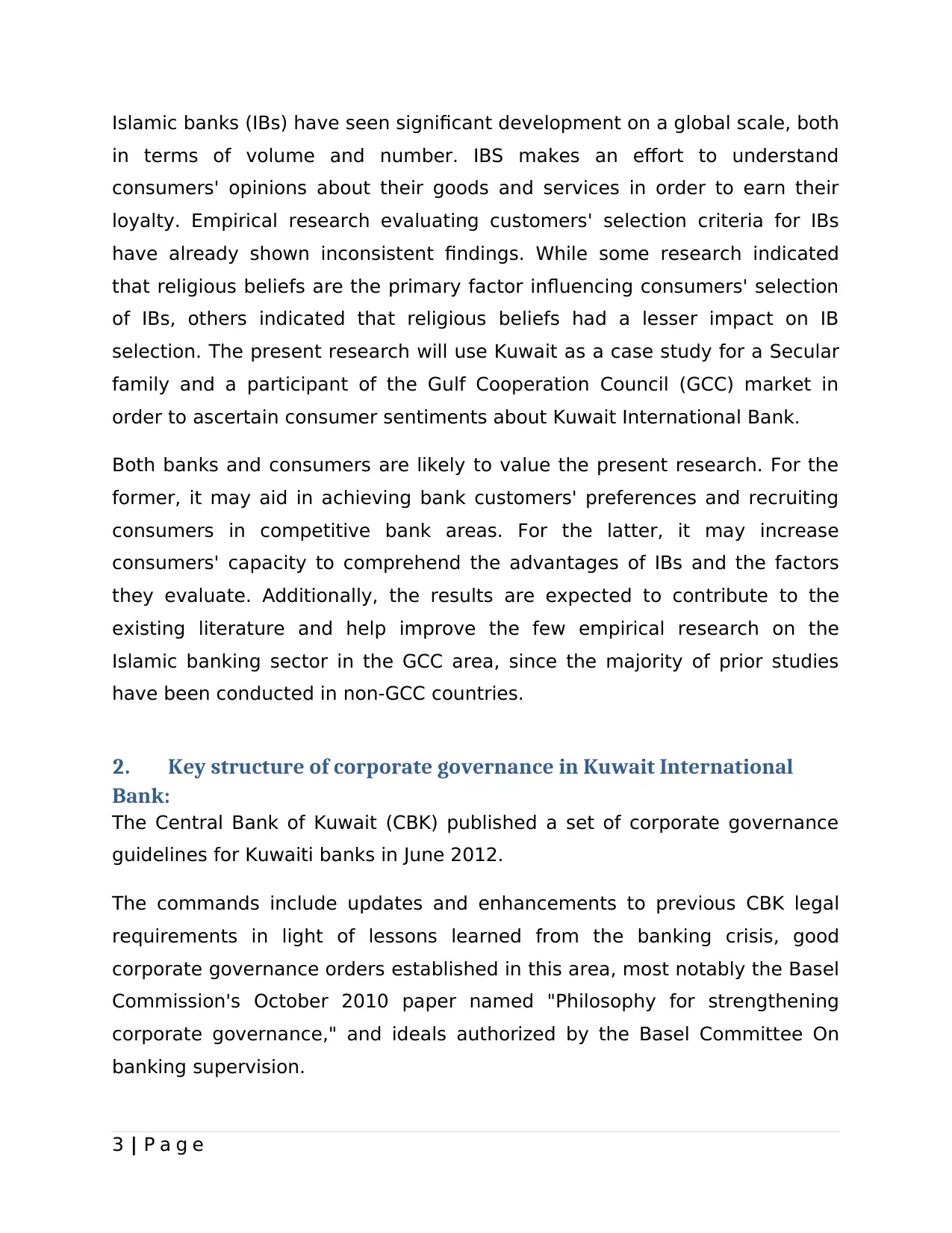
Islamic banks (IBs) have seen significant development on a global scale, both
in terms of volume and number. IBS makes an effort to understand
consumers' opinions about their goods and services in order to earn their
loyalty. Empirical research evaluating customers' selection criteria for IBs
have already shown inconsistent findings. While some research indicated
that religious beliefs are the primary factor influencing consumers' selection
of IBs, others indicated that religious beliefs had a lesser impact on IB
selection. The present research will use Kuwait as a case study for a Secular
family and a participant of the Gulf Cooperation Council (GCC) market in
order to ascertain consumer sentiments about Kuwait International Bank.
Both banks and consumers are likely to value the present research. For the
former, it may aid in achieving bank customers' preferences and recruiting
consumers in competitive bank areas. For the latter, it may increase
consumers' capacity to comprehend the advantages of IBs and the factors
they evaluate. Additionally, the results are expected to contribute to the
existing literature and help improve the few empirical research on the
Islamic banking sector in the GCC area, since the majority of prior studies
have been conducted in non-GCC countries.
2. Key structure of corporate governance in Kuwait International
Bank:
The Central Bank of Kuwait (CBK) published a set of corporate governance
guidelines for Kuwaiti banks in June 2012.
The commands include updates and enhancements to previous CBK legal
requirements in light of lessons learned from the banking crisis, good
corporate governance orders established in this area, most notably the Basel
Commission's October 2010 paper named "Philosophy for strengthening
corporate governance," and ideals authorized by the Basel Committee On
banking supervision.
3 | P a g e
in terms of volume and number. IBS makes an effort to understand
consumers' opinions about their goods and services in order to earn their
loyalty. Empirical research evaluating customers' selection criteria for IBs
have already shown inconsistent findings. While some research indicated
that religious beliefs are the primary factor influencing consumers' selection
of IBs, others indicated that religious beliefs had a lesser impact on IB
selection. The present research will use Kuwait as a case study for a Secular
family and a participant of the Gulf Cooperation Council (GCC) market in
order to ascertain consumer sentiments about Kuwait International Bank.
Both banks and consumers are likely to value the present research. For the
former, it may aid in achieving bank customers' preferences and recruiting
consumers in competitive bank areas. For the latter, it may increase
consumers' capacity to comprehend the advantages of IBs and the factors
they evaluate. Additionally, the results are expected to contribute to the
existing literature and help improve the few empirical research on the
Islamic banking sector in the GCC area, since the majority of prior studies
have been conducted in non-GCC countries.
2. Key structure of corporate governance in Kuwait International
Bank:
The Central Bank of Kuwait (CBK) published a set of corporate governance
guidelines for Kuwaiti banks in June 2012.
The commands include updates and enhancements to previous CBK legal
requirements in light of lessons learned from the banking crisis, good
corporate governance orders established in this area, most notably the Basel
Commission's October 2010 paper named "Philosophy for strengthening
corporate governance," and ideals authorized by the Basel Committee On
banking supervision.
3 | P a g e
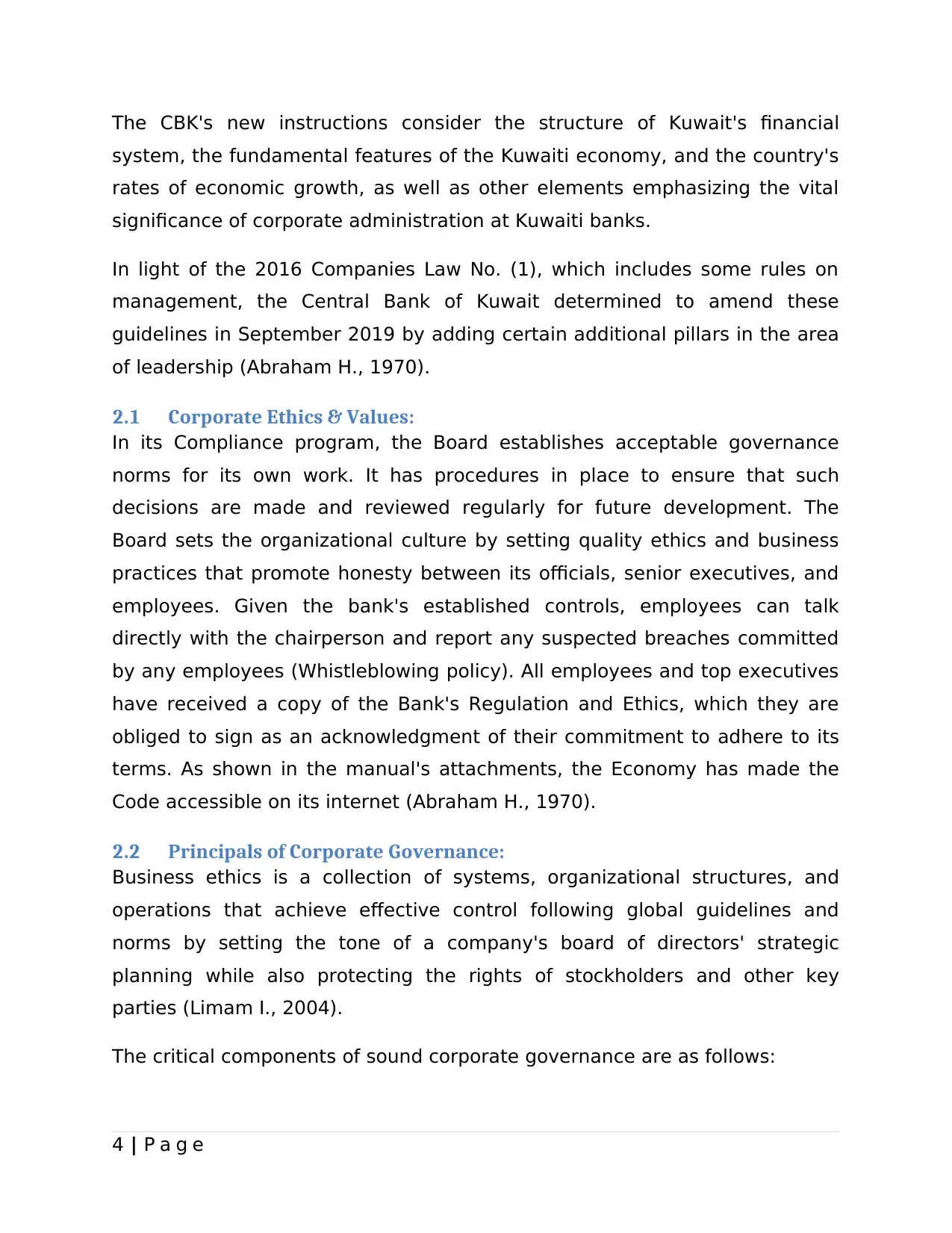
The CBK's new instructions consider the structure of Kuwait's financial
system, the fundamental features of the Kuwaiti economy, and the country's
rates of economic growth, as well as other elements emphasizing the vital
significance of corporate administration at Kuwaiti banks.
In light of the 2016 Companies Law No. (1), which includes some rules on
management, the Central Bank of Kuwait determined to amend these
guidelines in September 2019 by adding certain additional pillars in the area
of leadership (Abraham H., 1970).
2.1 Corporate Ethics & Values:
In its Compliance program, the Board establishes acceptable governance
norms for its own work. It has procedures in place to ensure that such
decisions are made and reviewed regularly for future development. The
Board sets the organizational culture by setting quality ethics and business
practices that promote honesty between its officials, senior executives, and
employees. Given the bank's established controls, employees can talk
directly with the chairperson and report any suspected breaches committed
by any employees (Whistleblowing policy). All employees and top executives
have received a copy of the Bank's Regulation and Ethics, which they are
obliged to sign as an acknowledgment of their commitment to adhere to its
terms. As shown in the manual's attachments, the Economy has made the
Code accessible on its internet (Abraham H., 1970).
2.2 Principals of Corporate Governance:
Business ethics is a collection of systems, organizational structures, and
operations that achieve effective control following global guidelines and
norms by setting the tone of a company's board of directors' strategic
planning while also protecting the rights of stockholders and other key
parties (Limam I., 2004).
The critical components of sound corporate governance are as follows:
4 | P a g e
system, the fundamental features of the Kuwaiti economy, and the country's
rates of economic growth, as well as other elements emphasizing the vital
significance of corporate administration at Kuwaiti banks.
In light of the 2016 Companies Law No. (1), which includes some rules on
management, the Central Bank of Kuwait determined to amend these
guidelines in September 2019 by adding certain additional pillars in the area
of leadership (Abraham H., 1970).
2.1 Corporate Ethics & Values:
In its Compliance program, the Board establishes acceptable governance
norms for its own work. It has procedures in place to ensure that such
decisions are made and reviewed regularly for future development. The
Board sets the organizational culture by setting quality ethics and business
practices that promote honesty between its officials, senior executives, and
employees. Given the bank's established controls, employees can talk
directly with the chairperson and report any suspected breaches committed
by any employees (Whistleblowing policy). All employees and top executives
have received a copy of the Bank's Regulation and Ethics, which they are
obliged to sign as an acknowledgment of their commitment to adhere to its
terms. As shown in the manual's attachments, the Economy has made the
Code accessible on its internet (Abraham H., 1970).
2.2 Principals of Corporate Governance:
Business ethics is a collection of systems, organizational structures, and
operations that achieve effective control following global guidelines and
norms by setting the tone of a company's board of directors' strategic
planning while also protecting the rights of stockholders and other key
parties (Limam I., 2004).
The critical components of sound corporate governance are as follows:
4 | P a g e
Secure Best Marks with AI Grader
Need help grading? Try our AI Grader for instant feedback on your assignments.
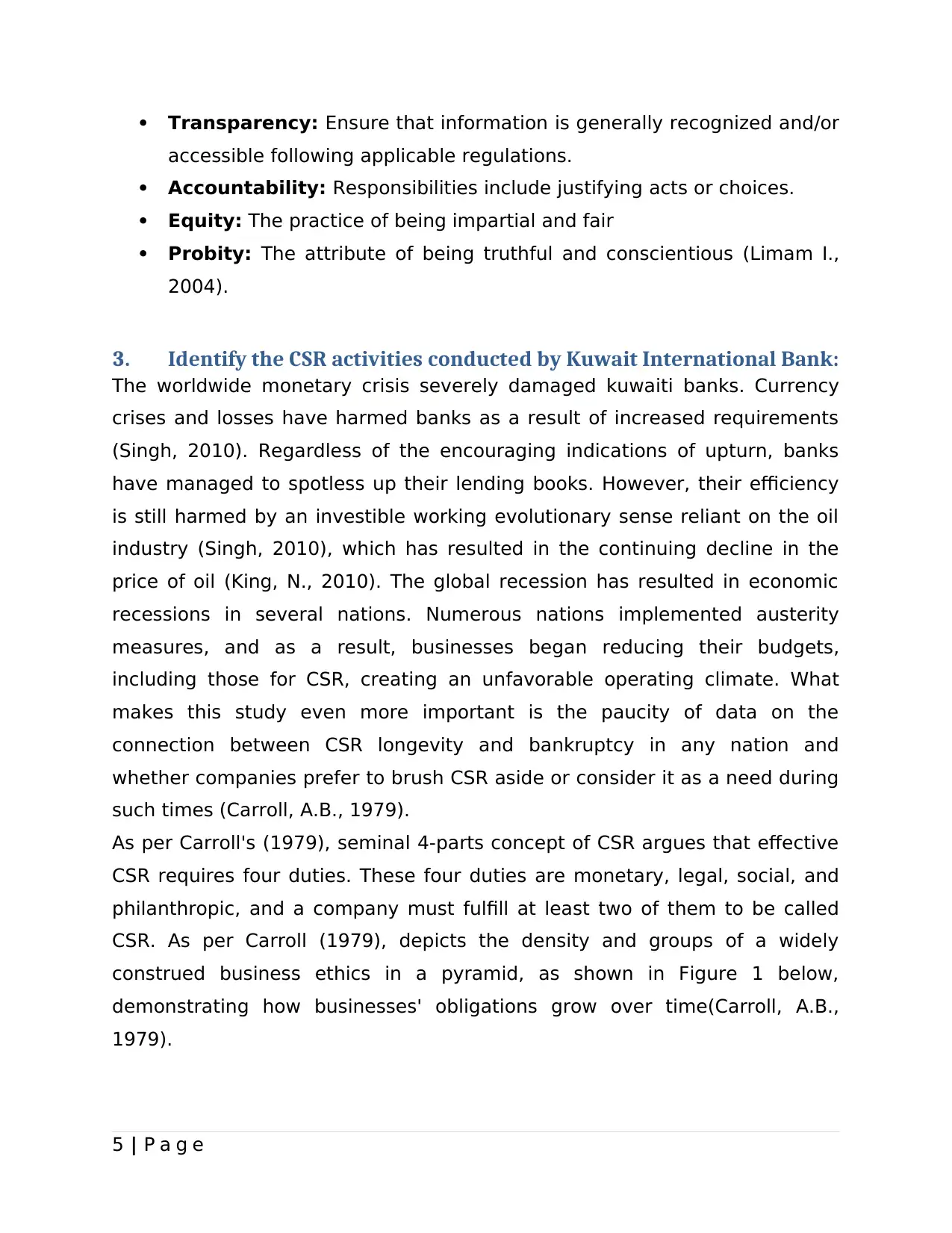
Transparency: Ensure that information is generally recognized and/or
accessible following applicable regulations.
Accountability: Responsibilities include justifying acts or choices.
Equity: The practice of being impartial and fair
Probity: The attribute of being truthful and conscientious (Limam I.,
2004).
3. Identify the CSR activities conducted by Kuwait International Bank:
The worldwide monetary crisis severely damaged kuwaiti banks. Currency
crises and losses have harmed banks as a result of increased requirements
(Singh, 2010). Regardless of the encouraging indications of upturn, banks
have managed to spotless up their lending books. However, their efficiency
is still harmed by an investible working evolutionary sense reliant on the oil
industry (Singh, 2010), which has resulted in the continuing decline in the
price of oil (King, N., 2010). The global recession has resulted in economic
recessions in several nations. Numerous nations implemented austerity
measures, and as a result, businesses began reducing their budgets,
including those for CSR, creating an unfavorable operating climate. What
makes this study even more important is the paucity of data on the
connection between CSR longevity and bankruptcy in any nation and
whether companies prefer to brush CSR aside or consider it as a need during
such times (Carroll, A.B., 1979).
As per Carroll's (1979), seminal 4-parts concept of CSR argues that effective
CSR requires four duties. These four duties are monetary, legal, social, and
philanthropic, and a company must fulfill at least two of them to be called
CSR. As per Carroll (1979), depicts the density and groups of a widely
construed business ethics in a pyramid, as shown in Figure 1 below,
demonstrating how businesses' obligations grow over time(Carroll, A.B.,
1979).
5 | P a g e
accessible following applicable regulations.
Accountability: Responsibilities include justifying acts or choices.
Equity: The practice of being impartial and fair
Probity: The attribute of being truthful and conscientious (Limam I.,
2004).
3. Identify the CSR activities conducted by Kuwait International Bank:
The worldwide monetary crisis severely damaged kuwaiti banks. Currency
crises and losses have harmed banks as a result of increased requirements
(Singh, 2010). Regardless of the encouraging indications of upturn, banks
have managed to spotless up their lending books. However, their efficiency
is still harmed by an investible working evolutionary sense reliant on the oil
industry (Singh, 2010), which has resulted in the continuing decline in the
price of oil (King, N., 2010). The global recession has resulted in economic
recessions in several nations. Numerous nations implemented austerity
measures, and as a result, businesses began reducing their budgets,
including those for CSR, creating an unfavorable operating climate. What
makes this study even more important is the paucity of data on the
connection between CSR longevity and bankruptcy in any nation and
whether companies prefer to brush CSR aside or consider it as a need during
such times (Carroll, A.B., 1979).
As per Carroll's (1979), seminal 4-parts concept of CSR argues that effective
CSR requires four duties. These four duties are monetary, legal, social, and
philanthropic, and a company must fulfill at least two of them to be called
CSR. As per Carroll (1979), depicts the density and groups of a widely
construed business ethics in a pyramid, as shown in Figure 1 below,
demonstrating how businesses' obligations grow over time(Carroll, A.B.,
1979).
5 | P a g e
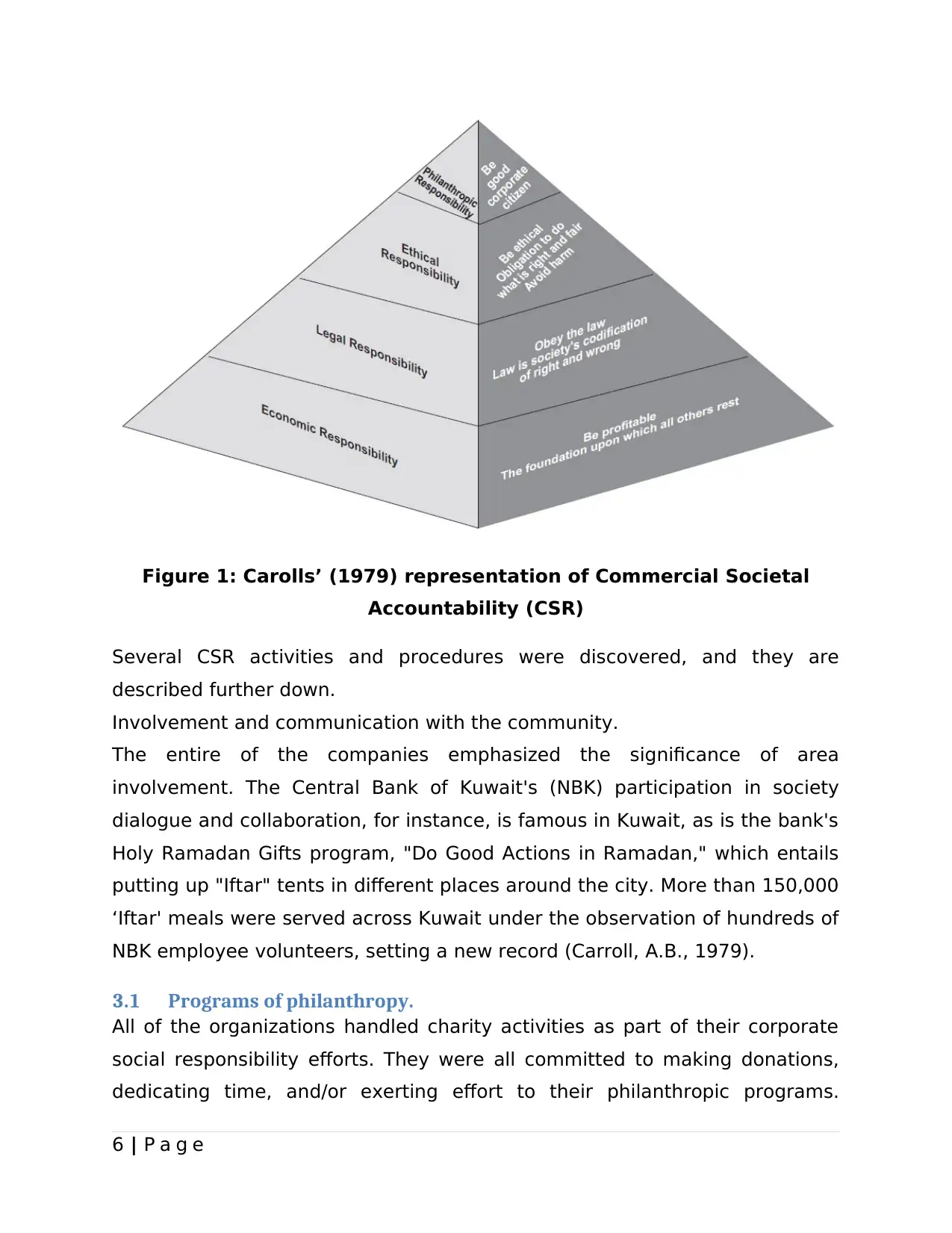
Figure 1: Carolls’ (1979) representation of Commercial Societal
Accountability (CSR)
Several CSR activities and procedures were discovered, and they are
described further down.
Involvement and communication with the community.
The entire of the companies emphasized the significance of area
involvement. The Central Bank of Kuwait's (NBK) participation in society
dialogue and collaboration, for instance, is famous in Kuwait, as is the bank's
Holy Ramadan Gifts program, "Do Good Actions in Ramadan," which entails
putting up "Iftar" tents in different places around the city. More than 150,000
‘Iftar' meals were served across Kuwait under the observation of hundreds of
NBK employee volunteers, setting a new record (Carroll, A.B., 1979).
3.1 Programs of philanthropy.
All of the organizations handled charity activities as part of their corporate
social responsibility efforts. They were all committed to making donations,
dedicating time, and/or exerting effort to their philanthropic programs.
6 | P a g e
Accountability (CSR)
Several CSR activities and procedures were discovered, and they are
described further down.
Involvement and communication with the community.
The entire of the companies emphasized the significance of area
involvement. The Central Bank of Kuwait's (NBK) participation in society
dialogue and collaboration, for instance, is famous in Kuwait, as is the bank's
Holy Ramadan Gifts program, "Do Good Actions in Ramadan," which entails
putting up "Iftar" tents in different places around the city. More than 150,000
‘Iftar' meals were served across Kuwait under the observation of hundreds of
NBK employee volunteers, setting a new record (Carroll, A.B., 1979).
3.1 Programs of philanthropy.
All of the organizations handled charity activities as part of their corporate
social responsibility efforts. They were all committed to making donations,
dedicating time, and/or exerting effort to their philanthropic programs.
6 | P a g e
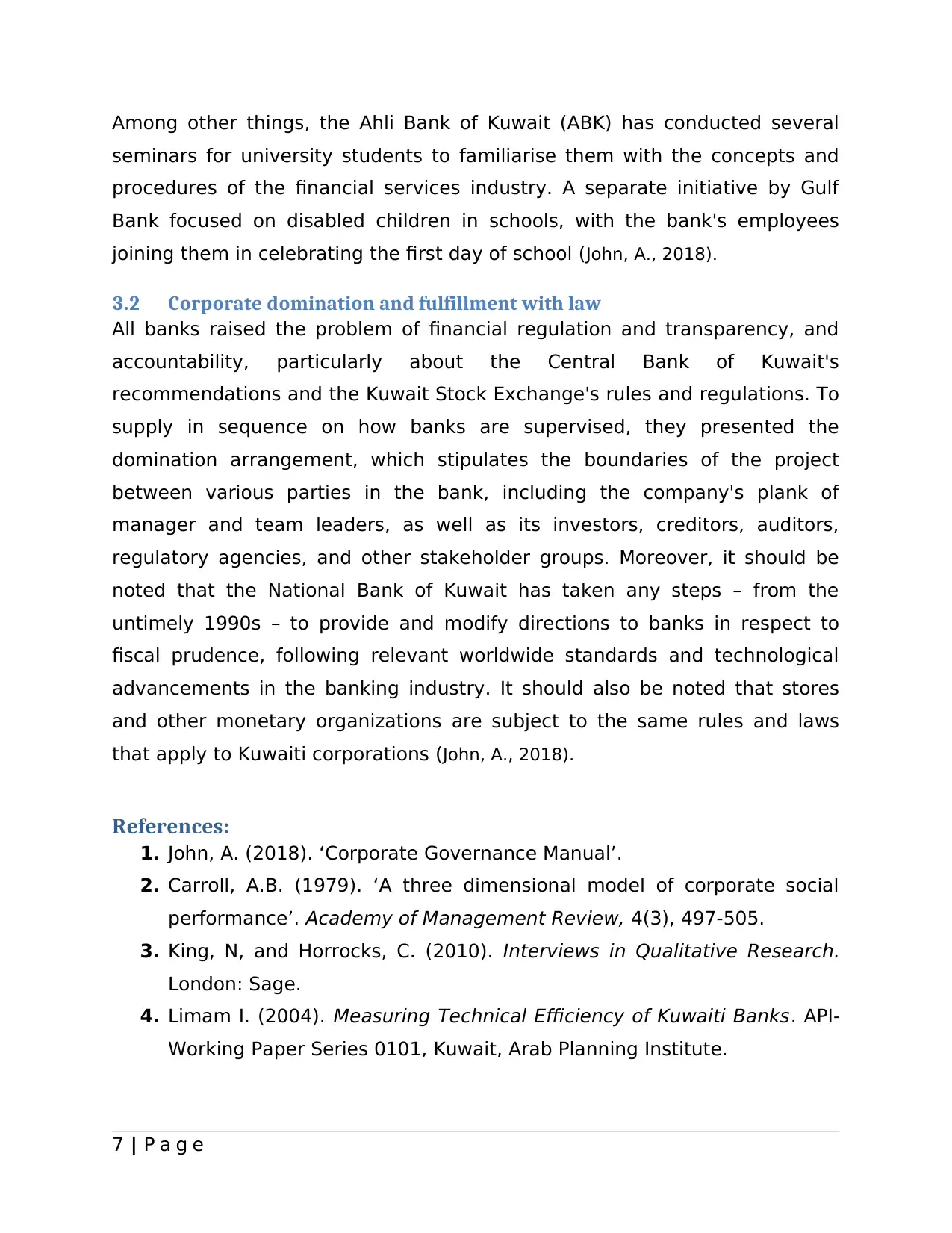
Among other things, the Ahli Bank of Kuwait (ABK) has conducted several
seminars for university students to familiarise them with the concepts and
procedures of the financial services industry. A separate initiative by Gulf
Bank focused on disabled children in schools, with the bank's employees
joining them in celebrating the first day of school (John, A., 2018).
3.2 Corporate domination and fulfillment with law
All banks raised the problem of financial regulation and transparency, and
accountability, particularly about the Central Bank of Kuwait's
recommendations and the Kuwait Stock Exchange's rules and regulations. To
supply in sequence on how banks are supervised, they presented the
domination arrangement, which stipulates the boundaries of the project
between various parties in the bank, including the company's plank of
manager and team leaders, as well as its investors, creditors, auditors,
regulatory agencies, and other stakeholder groups. Moreover, it should be
noted that the National Bank of Kuwait has taken any steps – from the
untimely 1990s – to provide and modify directions to banks in respect to
fiscal prudence, following relevant worldwide standards and technological
advancements in the banking industry. It should also be noted that stores
and other monetary organizations are subject to the same rules and laws
that apply to Kuwaiti corporations (John, A., 2018).
References:
1. John, A. (2018). ‘Corporate Governance Manual’.
2. Carroll, A.B. (1979). ‘A three dimensional model of corporate social
performance’. Academy of Management Review, 4(3), 497-505.
3. King, N, and Horrocks, C. (2010). Interviews in Qualitative Research.
London: Sage.
4. Limam I. (2004). Measuring Technical Efficiency of Kuwaiti Banks. API-
Working Paper Series 0101, Kuwait, Arab Planning Institute.
7 | P a g e
seminars for university students to familiarise them with the concepts and
procedures of the financial services industry. A separate initiative by Gulf
Bank focused on disabled children in schools, with the bank's employees
joining them in celebrating the first day of school (John, A., 2018).
3.2 Corporate domination and fulfillment with law
All banks raised the problem of financial regulation and transparency, and
accountability, particularly about the Central Bank of Kuwait's
recommendations and the Kuwait Stock Exchange's rules and regulations. To
supply in sequence on how banks are supervised, they presented the
domination arrangement, which stipulates the boundaries of the project
between various parties in the bank, including the company's plank of
manager and team leaders, as well as its investors, creditors, auditors,
regulatory agencies, and other stakeholder groups. Moreover, it should be
noted that the National Bank of Kuwait has taken any steps – from the
untimely 1990s – to provide and modify directions to banks in respect to
fiscal prudence, following relevant worldwide standards and technological
advancements in the banking industry. It should also be noted that stores
and other monetary organizations are subject to the same rules and laws
that apply to Kuwaiti corporations (John, A., 2018).
References:
1. John, A. (2018). ‘Corporate Governance Manual’.
2. Carroll, A.B. (1979). ‘A three dimensional model of corporate social
performance’. Academy of Management Review, 4(3), 497-505.
3. King, N, and Horrocks, C. (2010). Interviews in Qualitative Research.
London: Sage.
4. Limam I. (2004). Measuring Technical Efficiency of Kuwaiti Banks. API-
Working Paper Series 0101, Kuwait, Arab Planning Institute.
7 | P a g e
1 out of 7
Your All-in-One AI-Powered Toolkit for Academic Success.
+13062052269
info@desklib.com
Available 24*7 on WhatsApp / Email
![[object Object]](/_next/static/media/star-bottom.7253800d.svg)
Unlock your academic potential
© 2024 | Zucol Services PVT LTD | All rights reserved.